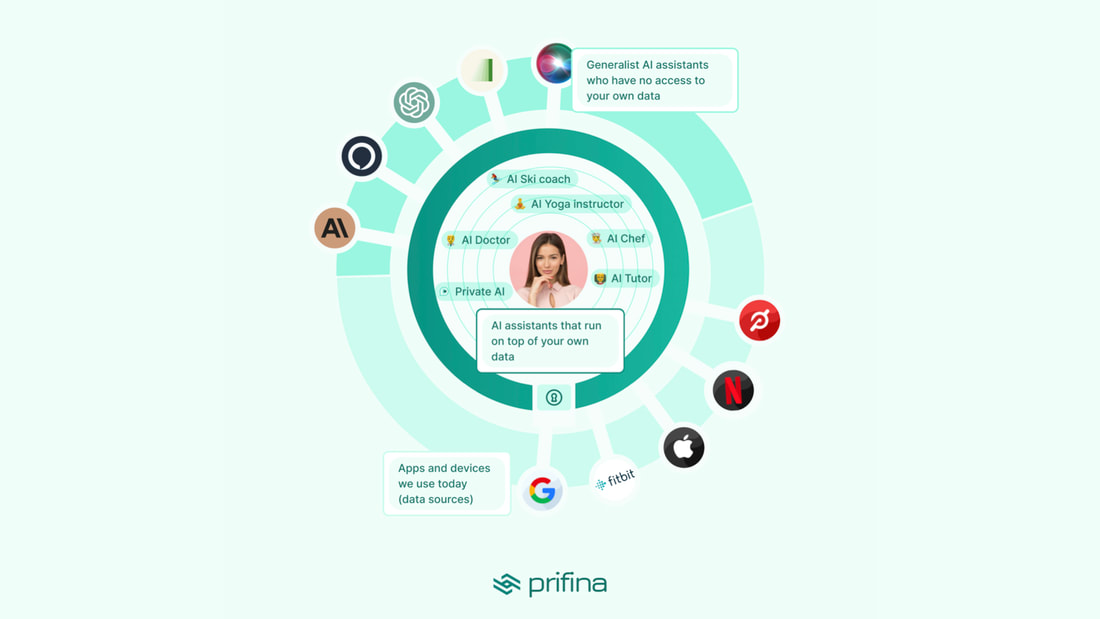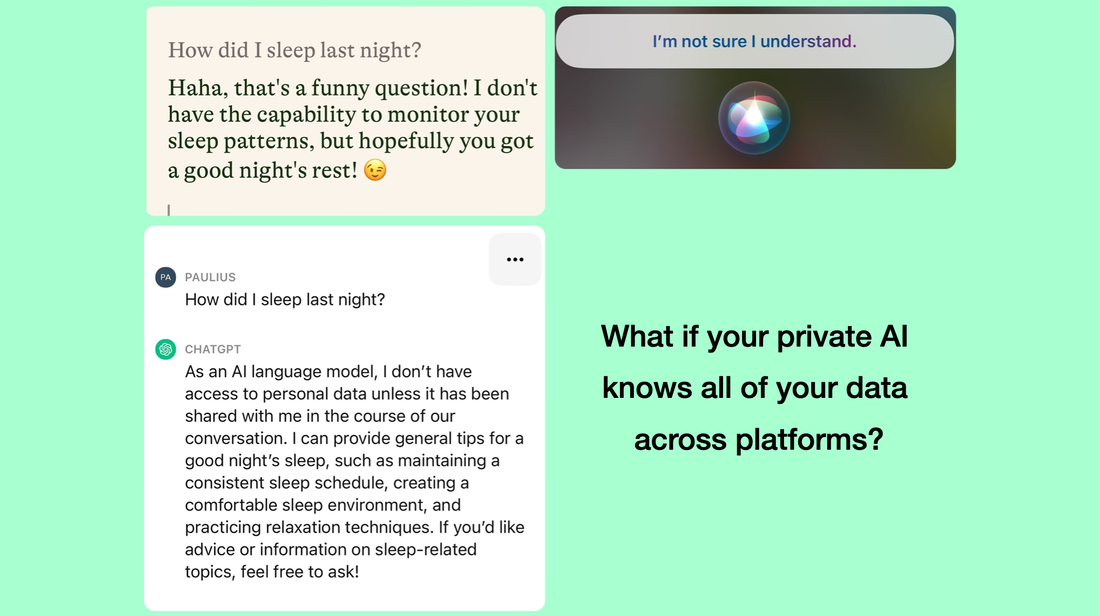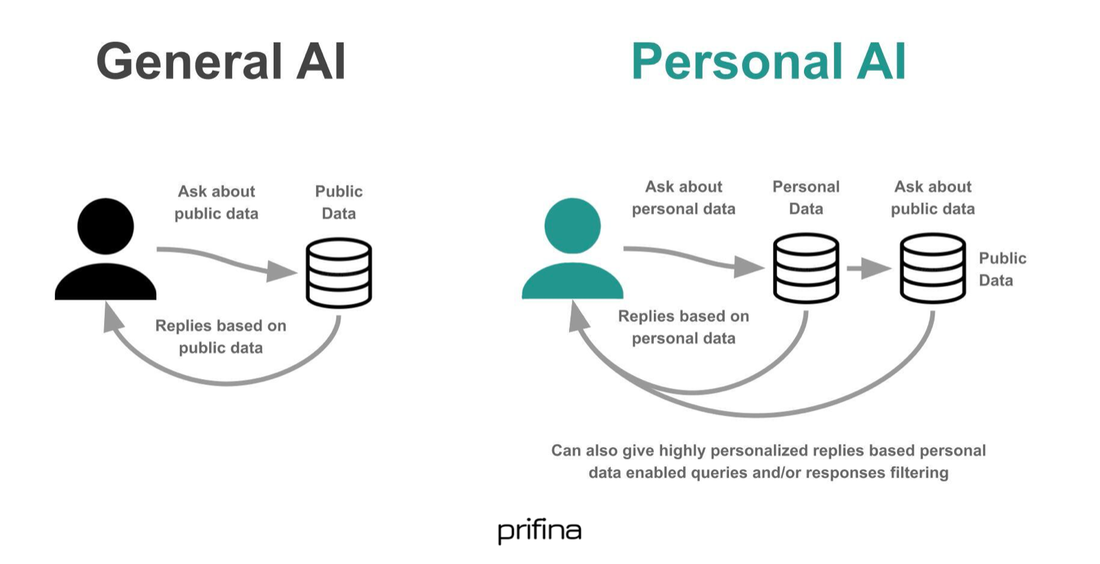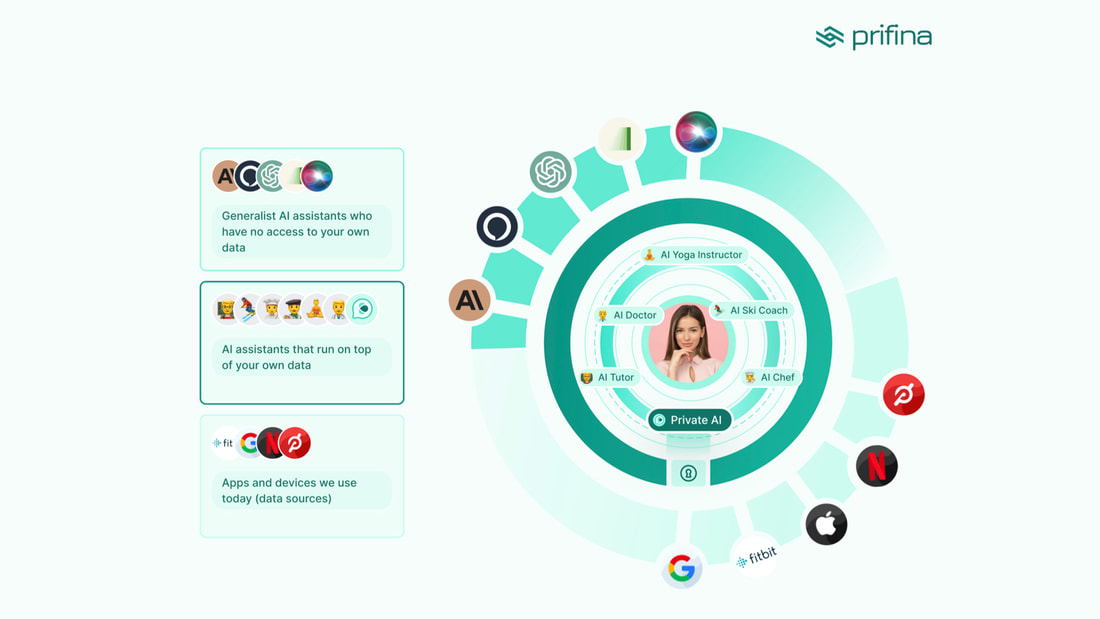|
“Whoever wins the personal agent, that’s [going to be] the big thing. Because you will never go to a search site again, you’ll never go to Amazon again” - Bill Gates By dr. Paul Jurcys In the very near future, each of us will our personal AI assistants for every aspect of our lives. Each of us will have our personal AI doctor, personal AI coach, personal AI nutritionist, or digital assistant that will help us organize our calendars, schedule events, and purchase items on our behalf. Such AI-powered assistants will augment our abilities and help get rid of time-consuming tasks, and focus on things that matter most.
Buzz In the Market In the past few months, there has been quite a bit of excitement about the possibility of building truly personal AI:
A massive investment in InflectionAI could be seen as an attempt to stave off any potential competition and secure dominance in this rapidly emerging domain. Shortage of Experts Today, we are unfortunately facing a remarkable shortage of experts. With over 8 billion people on Earth, there are a mere 10 million doctors. Teachers struggle to spend enough time on direct interactions with every student in the class. On a personal level, we often lack someone equally knowledgeable or passionate about our favorite topics. In times of grief, suffering, and emotional pain, the desire for a close companion to provide advice and understanding becomes ever more acute. This is where the transformative power of AI comes in. In the near future, countless individuals, potentially everyone, will be able to augment their personal capabilities with our own personal AI assistants. The trajectory toward universal access to intelligence is clearly mapped out: we can expect that any person with access to the internet and a hand-held device will have access to the same expert advice from a doctor, an educator, or any other specialist, all through their personal AI. 2 Ways to Build Personal AI As technology continues to leap forward at ever-increasing speed, personal AI assistants are evolving to become more sophisticated and versatile. There are two paths of bringing AI superpowers to humans: A top-down approach: after the release of ChatGPT and other generative AI tools, we are witnessing an influx of various personal AI assistants that are supposed to hello us find information, summarize text, or generate images. The top-down approach is rooted in creating software applications - personal AI assistants - that are marketed as tools to help us solve various daily tasks and assignments or offer us a companion, a buddy that is available 24/7. Think of InflectionAI’s Pi, Midjourney, Dalle, and countless others. However, most of our essential tasks are rooted in the physical world: we need to eat, sleep, and and go to the bathroom. As cheap sensors are being integrated in our wearable devices and environments around us, individuals have tools and ability to track personal biological clock - we start living quantified lives. If you are a runner, you probably have a fitness tracker to measure your running distance and heart rate, as well as recovery rate. Also, our cars track hundreds of data points (e.g., acceleration, braking, engine performance, and outside factors). Scientists around the world are building assistive robots to help us to recover from injuries or learn important skills. These sensor-derived data sets also lead to the development of AI-powered applications that help optimize different aspects of our lives. This sensor-data-AI path resembles a bottom-up approach to building personal AI. Data Eats the World, But How to Access Data? AI assistants such as ChatGPT, or PI, are amazing in answering our general questions and performing general tasks. However, if you ask anything personal, something related to yourself, they stumble. Let’s see what responses we get to the question “How did I sleep last night?”: How come!? Isn’t it odd that if you wear Apple watches that track our activity, sleep and process various biometric data, Siri - an AI assistant built by Apple for Apple’s products - is not able to answer such a simple question?! Eventually, every company building personal AI will face the challenge of connecting the personal AI to the user’s own data. To build a truly personal AI, we need not only general knowledge from publicly available sources and research repositories, we also need to bring this general, publicly available knowledge and correlate it with the specific data of each individual. In other words, to build a truly personal AI, Ai assistant must be able to access to the user’s personal data. Otherwise, the AI assistant will be a generalist, not a personal: This is where Prifina’s human-centric approach to data comes into play: with Prifina’s user-held data model, it is possible to bring those personal AI assistants to each individual and run those personal AI assistants “on top of” each user’s own data, privately. In Prifina’s personal data ecosystem, each individual user connects their data from personal data sources to their own data “vault”, where data is collected and unified. AI-powered apps and assistants run in each individual users’ data environment. Each individual user’s data is private by default. A human-centric approach to data opens vast opportunities for the use of personal data: not only personal AI assistants can answer the question about last night’s sleep, but ML and LLMs can offer new possibilities for personalization and automation of tasks and generate new value for individuals. Multi-Agent Interface So how many personal AI assistants can there be? And how many AI assistants can one person handle? As humans, we have limited time and a limited attention span. Our guess is that each of us will be really interacting with 5, 7 or 10 digital agents (similar to a manager at a corporation who has 7-10 directly responding employees). The image below illustrates the universe of digital assistants in the human-centric environment:
These digital agents will also vary in their expertise, capabilities, and proximity to the individual human being. It is likely, that people will have their own AI doctors, AI coaches, and AI-powered shopping assistants who will help to achieve specialized tasks.
Some of them will operate in the “inner orbit” - on top of the user’s own data, privately, while other AI assistants will be generalists, and will not have access to user’s own data. In this multi-agent environment, one possible scenario is that each individual will have one primary and preferred assistant - we can call it “my personal AI.” But how will those digital agents and assistants interact with one another? What technological infrastructure is needed to make them talk to one another? Assume you feel unwell and suffer from an upset stomach, which personal AI assistant do you go first? You might go to your “own private AI” and ask “Why do I feel pain in my stomach”? Your own personal AI may refer you to your personal AI doctor. In this kind of scenario, it will be important to make sure that the initial inquiry made by you to your own personal AI is automatically transmitted to other agents. This will ensure that your AI doctor will already know your concern and will be able to continue the conversation. Such communication between AI-powered agents can only be possible in the human-centric data environment, where all the AI experts run on the user’s side. Sharing sensitive data outside of the user’s own personal data environment is not optimal. In fact, such communication between agents would be impossible in the old, enterprise-centric data ecosystem where data is locked in separate silos. Paths Forward As we stand on the entrance gates to the age of AI, the future seems quite exciting: how will our lives change when each of us will be able to tap into the potential of our Personal AI? The integration of Personal AI agents into our daily lives is not a question of if, but when and how. To bring this vision into reality, a shift in thinking is required. We need to embrace a human-centric data paradigm where our Private AI is operating on our side, on our own data, privately. At Prifina we are building an infrastructure to empower each individual with such “steamengines of the mind”; we want to empower developers to build Personal AI applications for people to augment each individual’s creative potential. Join us!
2 Comments
|
Archives
May 2024
Categories
All
|
Sign up for updates* Prifina will not share it with any third party.
|
The User-Held Data CompanyPrifina is a venture-backed personal data technology company based in San Francisco. Prifina provides a personal data platform that empowers individuals to collect, combine and utilize their personal data to live happier and healthier lives. Consumer brands and developers can build apps and personal AI agents on top of user-held data.
© 2024 Prifina, Inc.
|










